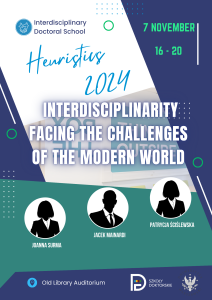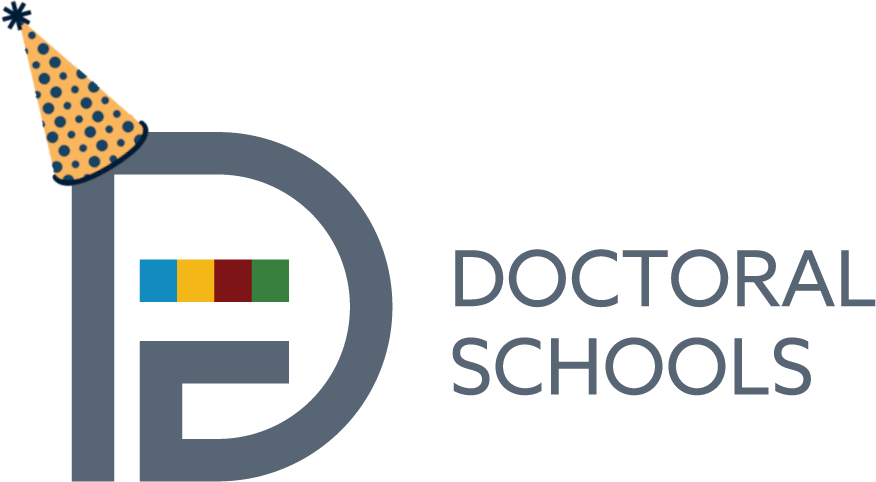Heuristics – Interdisciplinarity facing the challenges of the modern world

The “Heuristics” series was initiated by the Rector of the University of Warsaw, Prof. Alojzy Z. Nowak, and consists of four meetings per year. During each meeting, young researchers, supported by their supervisors, present the results of their research and participate in discussions with the audience.
– “Through ‘Heuristics,’ we gain deeper insights into the research conducted by our doctoral students. This also increases their chances of publishing articles in national and international journals,” said Prof. Alojzy Z. Nowak, Rector of the University of Warsaw.
The “Heuristics” series was created on the initiative of the Rector of the University of Warsaw and includes four meetings per year. During the fifth meeting, titled “Interdisciplinarity facing the challenges of the modern world,” organized by the Interdisciplinary Doctoral School (MSD), the following research projects were presented:
- Patrycja Ściślewska with her supervisors (“A Synchronized Duet: How Biology and Psychology Join Forces to Explain the Complexity of Human Circadian Rhythms”);
- Jacek Mainardi with his supervisors (“Trees Obscuring the Forest: Concentration Control in the Banking Sector”);
- Joanna Surma with her supervisors (“Conductive Hearing Loss: Audiological and Musical Aspects”).
This year’s edition of “Heuristics” was simultaneously interpreted into English via the ZOOM platform.
Patrycja Ściślewska
 Scientific Interests:
Scientific Interests:
A third-year doctoral student at the Interdisciplinary Doctoral School of the University of Warsaw (UW). She holds degrees in Biotechnology and Chemistry from the Interfaculty Individual Studies in Mathematics and Natural Sciences (MISMaP) program. Currently, her research is conducted at the Department of Animal Physiology, Faculty of Biology, UW; the Laboratory of Neurobiology of Emotions at the Marceli Nencki Institute of Experimental Biology, Polish Academy of Sciences; and the Faculty of Biology at Northeastern Illinois University in Chicago, USA. Her doctoral dissertation supervisors are Dr. Piotr Bębas, Prof. UW; Dr. Iwona Szatkowska; and Prof. Aaron Schirmer, PhD.
Her doctoral research focuses on the neurobiology of sleep and the biological clock. She investigates the neuronal, psychological, and genetic foundations of chronotype and circadian rhythm robustness.
Presentation Summary:
During the meeting, she will discuss the topic of human circadian rhythmicity. The presentation will focus not only on the well-known concept of chronotype but also on the less-studied dimension of circadian rhythmicity—rhythm robustness (the subjective amplitude of the rhythm). The results of psychometric studies, including personality traits and emotional characteristics of participants, will be presented. Additionally, neurobiological aspects will be explored, including differences in brain structure and activity (MRI and fMRI studies) among individuals with varying circadian clock traits.
Jacek Mainardi

Scientific Interests:
My research interests include competition law, the institutional law of the European Union, and human rights. In my work, I examine law through the lens of institutional economics.
Presentation Summary:
During the last banking crisis, many mergers and acquisitions turned out to have catastrophic consequences, despite being subject to regulatory oversight. In my presentation, I outline the shortcomings of the analyses conducted by competition authorities and propose changes to these analyses to prevent similar issues in the future.
Joanna Surma
 Scientific Interests:
Scientific Interests:
My interests include music and musicology, particularly the psychology of music and ethnomusicology, as well as otolaryngology, with a focus on audiology and hearing physiology. Additionally, I am interested in linguistics and am fluent in several languages, having completed studies in Italian and Arabic at the University of Warsaw.
Presentation Summary:
The presentation will focus on the audiological and musical aspects of hearing. It will address issues related to the perception of music and sounds in cases of conductive hearing loss and present current advancements in music therapy for hearing loss. Selected aspects of the anatomy and physiology of hearing will also be discussed, with particular emphasis on differentiating between conductive and sensorineural hearing loss from an audiological perspective.

